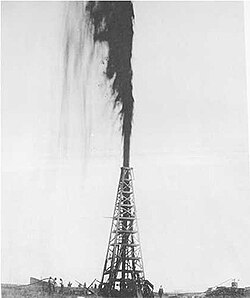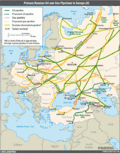Portal:Energy
| Main page | New articles & Tasks |
 The Energy Portal Welcome to Wikipedia's Energy portal, your gateway to energy. This portal is aimed at giving you access to all energy related topics in all of its forms.
|
Page contents: Selected article • Selected image • Selected biography • Did you know? • General images • Quotations • Related portals • Wikiprojects • Major topics • Categories • Help • Associated Wikimedia |
Introduction
Energy (from Ancient Greek ἐνέργεια (enérgeia) 'activity') is the quantitative property that is transferred to a body or to a physical system, recognizable in the performance of work and in the form of heat and light. Energy is a conserved quantity—the law of conservation of energy states that energy can be converted in form, but not created or destroyed. The unit of measurement for energy in the International System of Units (SI) is the joule (J).
Forms of energy include the kinetic energy of a moving object, the potential energy stored by an object (for instance due to its position in a field), the elastic energy stored in a solid object, chemical energy associated with chemical reactions, the radiant energy carried by electromagnetic radiation, the internal energy contained within a thermodynamic system, and rest energy associated with an object's rest mass. These are not mutually exclusive.
All living organisms constantly take in and release energy. The Earth's climate and ecosystems processes are driven primarily by radiant energy from the sun. The energy industry provides the energy required for human civilization to function, which it obtains from energy resources such as fossil fuels, nuclear fuel, and renewable energy. (Full article...)
Selected article
The major petroleum strikes that began the rapid growth in petroleum exploration and speculation occurred in Southeast Texas, but soon reserves were found across Texas and wells were constructed in North Texas, East Texas, and the Permian Basin in West Texas. By 1940 Texas had come to dominate U.S. production. Some historians even define the beginning of the world's Oil Age as the beginning of this era in Texas.
Selected image

Photo credit: Charliebrown7034
Skyglow over New York City, one form of light pollution.
Did you know?
- During World War I, the German Army produced shale oil from Yarmouk oil shale deposits in Jordan to operate the Hijazi Railway (pictured)?
- Dennis Spurgeon, formerly chief operating officer at uranium supplier USEC Inc., became the United States Assistant Secretary for Nuclear Energy in 2006?
- Japan Canada Oil Sands Limited was the first offshore oil company to exploit the Athabasca oil sands in Canada?
- Teesside Power Station is the largest combined-cycle gas turbine (CCGT) plant in Europe.?
- The Klaipėda Geothermal Demonstration Plant in Lithuania was the first geothermal plant in the Baltic Sea region?
- Hitachi Zosen Corporation built the first oil tanker in Japan in 1908 per an order by Standard Oil Company?
- Coalbed methane is a form of natural gas extracted from coal beds?
- When constructed in 1906, the Baku–Batumi pipeline was the world's longest kerosene pipeline?
Selected biography
Rockefeller founded the Standard Oil Company in 1870 and ran it until he retired in the late 1890s. He continued to retain his stock and his title as president until 1911, when the company was broken up for carrying out illegal monopoly practices. The new companies formed included the predecessors of Conoco, Amoco, Chevron, Esso, Mobil and Sohio. Rockefeller, who had rarely sold shares, owned stock in all of them. As gasoline had grown in importance his wealth had soared and he became the world's richest man and the first billionaire.
Rockefeller's fortune was used to create the modern systematic approach of targeted philanthropy with foundations that had a major impact on medicine, education, and scientific research. His foundations pioneered the development of medical research, and was instrumental in the eradication of hookworm and yellow fever. At his death, at the age of 98, Rockefeller's remaining fortune was estimated at $1.4 billion. As a percentage of the United States economy, no other American fortune has ever come close.
In the news
- 22 June 2025 – Middle Eastern crisis
- The International Atomic Energy Agency says no increase in off-site radiation levels was detected at the three targeted nuclear sites. (Al Jazeera)
- 13 June 2025 – Middle Eastern crisis
- Israeli decapitation strikes kill commander-in-chief of the Islamic Revolutionary Guard Corps Hossein Salami, senior nuclear scientist and former head of the Atomic Energy Organization of Iran Fereydoon Abbasi, and chief of the General Staff of the Armed Forces of the Islamic Republic of Iran Mohammad Bagheri and Quds Force commander Esmail Qaani. (The Times of Israel) (BBC News)
- 12 June 2025 – Nuclear program of Iran
- The International Atomic Energy Agency finds Iran in breach of its obligations to limit uranium enrichment and provision of information on its nuclear materials. (BBC News) (The Guardian)
- 6 June 2025 – Russian invasion of Ukraine
- Widespread power outages are reported in Ternopil after several cruise missiles hit energy infrastructure supplying the city. (Ukrinform)
- 29 May 2025 – Lliuya v RWE AG
- A court in Germany rejects a lawsuit filed by a Peruvian farmer against German energy firm RWE. Saúl Luciano Lliuya alleged that the firm's global emissions contributed to the melting of glaciers in Peru, threatening his hometown of Huaraz with flooding. (BBC News)
General images
Quotations
- "We simply must balance our demand for energy with our rapidly shrinking resources. By acting now we can control our future instead of letting the future control us." – Jimmy Carter, 1977
- "It is sensible to improve energy efficiency and to develop alternative and sustainable sources of supply; it's sensible to replant the forests which we consume; it's sensible to re-examine industrial processes; it's sensible to tackle the problem of waste. I understand that the latest vogue is to call them 'no regrets' policies. Certainly we should have none in putting them into effect." – Margaret Thatcher, 1990
- "We have the opportunity and potential to create an oil-free future today, it is potentially right around the corner - and, more often than not, the technology is already here." – John Kerry, 2003
Related portals
WikiProjects
WikiProjects connected with energy:
Other WikiProjects that may be of interest:
Major topics
Major categories
National energy supply, use & conservation
National electricity sector
Politics, economics, environment
- Climate change
- Energy conservation
- Energy economics
- Energy crises
- Energy development
- Energy policy
- Peak oil
Energy sources
- Fuels
- Biofuels
- Fossil fuels
- Fusion power
- Nuclear technology
- Renewable energy
- Energy conversion
- Electric power
- Energy storage
Energy-related design
Scientific usage
Help

Puzzled by energy?
Can't answer your question?
Don't understand the answer?
- Ask at the reference desk
- Read the Wikipedia help pages
For further ideas, to leave a comment, or to learn how you can help improve and update this portal, see the talk page.
Associated Wikimedia
The following Wikimedia Foundation sister projects provide more on this subject:
-
Commons
Free media repository -
Wikibooks
Free textbooks and manuals -
Wikidata
Free knowledge base -
Wikinews
Free-content news -
Wikiquote
Collection of quotations -
Wikisource
Free-content library -
Wikiversity
Free learning tools -
Wiktionary
Dictionary and thesaurus

























































































































































































